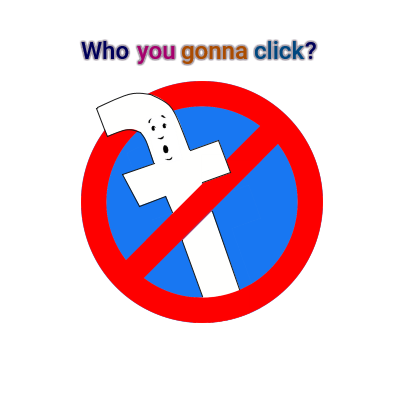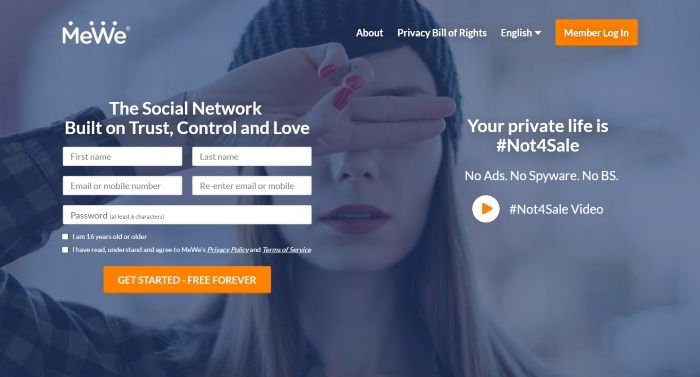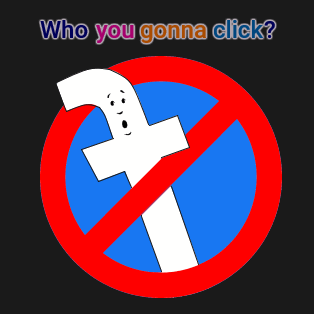I am not an activist, nor one to climb the barricades, but sometimes I get so provoked that I'd almost become one. Facebook's provocations over the years have had me pulling my hair out more than I'm willing to admit. So much so, that I'd almost climb those barricades "armed with clubs, axes, pitchforks, and firearms and carrying icons and banners"*1.
Pirating Privacy
I hope that everyone is aware by now that there is no such thing as Facebook and privacy. In fact, mentioning the two in the same sentence is almost blasphemous. Two of the most recent privacy and security breaches were:
- March 21, 2019: Facebook made public that millions of user account passwords had been stored in plain text format, which potentially allowed employees to gain access to people's accounts without their knowledge (source: Business Insider*2),
- April 4, 2019: "half a billion records of Facebook users were found exposed on Amazon cloud servers, containing information about users' friends, likes, groups, and checked-in locations, as well as names, passwords and email addresses" (source: Wikipedia: Facebook Privacy*3).
Did this frighten people? Apparently not.
I couldn't find detailed figures on the growth of Facebook's monthly active users (MAU) for the first half of 2019. However, all sites and statistics I checked agreed on one thing, which is that the total number of MAU on Facebook is stil growing. Worldwide, on March 31, 2019, there were over 2.38 billion MAU. Compared to 2.32 billion MAUs for Q4 2018, this is an 8 percent increase.
...mentioning Facebook and privacy in the same sentence is almost blasphemous.

So, people are still joining Facebook, despite the many privacy scandals that occurred*4 and after Mark Zuckerberg had appeared before two US Senate committees in April 2018 with a disdain that should have shocked Facebook's users, but hardly got any attention at all.
Admittedly though, those congress people didn't make things hard for him either.
Taking on the “gods of Silicon Valley”
Someone who did, and bravely so, is Carole Cadwalladr. She is a journalist for the Guardian and Observer in the UK. In April 2019 she held a TED Talk in front of the “gods of Silicon Valley”*5. In the audience were, among others, Mark Zuckerberg and Sheryl Sandberg.
TED talk by Carole Cadwalladr: Facebook's role in Brexit — and the threat to democracy
Below are three quotes from Carole's TED talk, although I urge you to click play and see and hear all of it yourself!
Christopher Wiley, ex-employee of Cambridge Analytica, ... "told me how this company that worked for both Trump and Brexit, had profiled people politically in order to understand their political fears, to better target them with Facebook ads. And it did this by illicitly harvesting the profiles of 87 million people from Facebook."
"It is not enough to say that you will do better in the future. Because to have any hope of stopping this from happening again, we have to know the truth."
...you set out to connect people. And you are refusing to acknowledge that the same technology is now driving us apart.
Carole Cadwalladr on Facebook's role in Brexit
User interface
What I also don't like about Facebook is its user interface. I'm sure Facebook has dedicated teams of talented and experienced engineers working on the interface. It must be painful for them to have to conclude that their efforts don't show.
I am not a specialist in UX design, but I think it's safe to say that this is due to a.) the over-complexity of the product, b.) the way everything interacts and c.) the rapid growth of the network.
Oh, I almost forgot: d.) the way Facebook is built around addiction-by-design. Which brings me to:
Facebook dependency
Notwithstanding privacy scandals and its bad interface, Facebook has permeated through many aspects of society. It has become so much more than 'just' the social network. Facebook offers Games and Messenger, it owns Instagram, WhatsApp and Oculus, and it has its like and share buttons displayed under practically every article published on the web, including - I can't deny it - this one. I even confess that my best read post to date*6 was actually pushed by links and captions that were posted on Instagram.
Every form of addiction is bad, no matter whether the narcotic be alcohol or morphine or idealism.
Carl Jung
People as well as companies have become dependent on Facebook and its services. So dependent actually, that it has become an addiction. You want to quit, but it's hard! And that is because Facebook has many triggers built-in that promote addiction. Facebook - in many respects - is like alcohol or morphine. I was surprised by the amount of articles online on the topic of Facebook and addiction. In the footnotes I have included two particularly interesting articles: one at Live Science*7 and one at The Washington Post online*8.
Addiction: 'a vulnerability in human psychology'
For those of you who are natural-born sceptics (which is a good feature to have): at an Axios conference in November 2017, founding president (of Facebook) Sean Parker admitted - almost in as many words - that Facebook was built around addiction-by-design, stating that the first step of building Facebook features was "How do we consume as much of your time and conscious attention as possible?" Parker also compared the design of Facebook to "exploiting a vulnerability in human psychology". (source: TechRepublic*4)
MeWe: a Facebook alternative
So, Facebook ignores privacy and it has a user interface that is puzzling at best.
On top of that it is truly shocking that Facebook thrives on, and in fact consciously and actively encourages, addiction. We may have to come to the scary conclusion that Facebook is impossible to escape from.
And even if we succeeded (to escape from Facebook), how would we stay in touch with friends and families? How could we quench our thirst for attention or satisfy our curiosity?
Well, there is an alternative and it is called MeWe (mewe.com).
MeWe is too young to say that this is _the_ alternative to Facebook, but it is promising. Better yet, there is a commitment to a social media future without commercial ads, scraping of metadata and spyware.

MeWe: 'The Social Network Built on Trust, Control and Love', login screen
MeWe's origins and ground principles
This commitment is laid down by MeWe in ground principles, called the "Privacy Bill of Rights"*9, in which they claim to be "uncompromising about trust, respect and integrity".
MeWe was created by Mark Weinstein, author, Internet corporate executive and privacy advocate. His goal was to give users of the site the maximum amount of privacy possible. Work on the site began in 2012 and was financially backed by private investors. (source: Wikipedia: MeWe*10)
MeWe was launched in 2016, not as a 'Facebook killer', which is not what Weinstein aspires to, but as a clean alternative.
In a post in the MeWe News and Updates group*11 on June 30, 2019, referring to an op-ed he wrote in the Wall Street Journal about votes to break up Facebook*12, this is what he shared: "[...] Let them [i.e. Facebook - O'Cor] be who they are, breaking them up is not the solution. MeWe and Facebook are competitors, and that is how democracy and capitalism work."
MeWe is a full-featured social network engineered with privacy-by-design that’s freemium-based with no ads, targeting or newsfeed manipulation. Marketers and election meddlers cannot target or boost anything to anyone.
Mark Weinstein, CEO and founder of MeWe
MeWe growth
In July 2018, the young social network surpassed the 2 million active members mark. Many of those new members came from Facebook and Google+, as did I.
On June 27, 2019, MeWe announced it had surpassed 5 million members and closed a $4.5 million offering, bringing the company's total funds raised to $15 million. (source: Yahoo! Finance*13)
In the same post in the aforementioned News and Updates group, Mark Weinstein shared that globally MeWe grew "...405% in 2018..." and is growing "...twice as fast on a daily basis in 2019."
MeWe and Sir Tim Berners-Lee
Sir Tim Berners-Lee is one of the advisors and advocates behind MeWe. He is considered the inventor of the modern web and is currently the director of the World Wide Web Consortium (W3C).
In 1991, Berners-Lee, a British physicist and computer scientist, developed the very first website. Since then he "has promoted open government data globally and spends time fighting for rights such as net neutrality, privacy and the openness of the Web" (source: w3.org).
Tim Berners-Lee:
"The original idea of the Web was that it should be a collaborative space where you can communicate through sharing information. The power to abuse the open Internet has become so tempting both for government and big companies. MeWe gives the power of the Internet back to the people with a platform built for collaboration and privacy."
MeWe gives the power of the Internet back to the people with a platform built for collaboration and privacy.
Sir Tim Berners-Lee, director of the World Wide Web Consortium
MeWe features
Like Facebook, MeWe offers pages, group meetings, conversations, chats, messages and more. However, they don't get scraped for your meta-data and all of them are ad-free. So, there is no commercial influence at all. That rest and peace of mind feels positively liberating.
That is not to say that there aren't any annoyances. People will be people and at MeWe too, some users post one nonsensical image after the other. Luckily, you can choose not to display these users' posts in your timeline.
More of MeWe's features are:
- Member data is #Not4Sale,
- Total control over your data and content: you own what you upload,
- No censorship or content manipulation,
- No facial recognition,
- Live voice and video,
- Disappearing content,
- True timeline ordering – no interference from logarithms or 'moderators',
- No news feed to push your content to the bottom of the page,
- Each public post, image, video, chat, comment, etc. is seen by all of your fellow MeWe members,
- A clear and crisp interface,
- Any member can make suggestions for improvements, new features, etc. (and they actually get applied as well),
- Multiple events calendars,
- MeWe supports multiple languages,
- Free 8GB of personal cloud storage (with 500Gb of storage as a paid feature add-on),
- Ultra secret chats with double-ratchet encryption (paid feature add-on).
The rest and peace of mind at MeWe feels positively liberating.
Conclusion
It's about time for people to understand that Facebook is not a big friendly giant. Facebook is deceitful, addictive and malevolent. Despite many promises, it shows no signs at all that it's changing its behaviour.
Both Carole Cadwalladr in her TED Talk and Mark Weinstein with MeWe take on Facebook. While Facebook is involved in one privacy scandal after another*4, MeWe is gaining traction.

With five million users and counting, MeWe is still the David of social media. We all know how Goliath ended up in the famous biblical story though. I'm putting my money on David.
Go on, have a look. Invite your friends. Wrestle free from the clutches of Facebook. It may feel a little like betrayal at first, but remember that it was Facebook that betrayed you in the first place.
In the words of Carole Cadwalladr: "It's up to us -- you, me and all of us. We are the ones who have to take back control."
Footnotes | Go back ^
- From "A peasant rebellion in Stalin's Russia: the Pitelinskii Uprising, Riazan 1930.", by Tracy McDonald, Journal of Social History, Sep 22, 2001
- Business Insider: Facebook employees had unfettered access to hundreds of millions of users' unencrypted passwords for years
- Wikipedia: Facebook #privacy
- TechRepublic: Facebook data privacy scandal: A cheat sheet
- The Guardian: Carole Cadwalladr: My TED talk: how I took on the tech titans in their lair
- This blog's best read article to date: It's here, it's great and it's Not Over Yet!
- Live Science: What Facebook Addiction Looks Like in the Brain
- The Washington Post online: It’s no accident that Facebook is so addictive
- MeWe: Privacy Bill of Rights
- Wikipedia: MeWe
- MeWe: the MeWe News and Updates group
- Wall Street Journal: I Compete With Facebook, and It’s No Monopoly (paid content)
- Yahoo! Finance: Remarkable MeWe Closes $4.5 Million Offering, Rockets Beyond 5 Million Members
Additional reading
- The Journal Blog, Mar. 10, 2019: Privacy? Mark Zuckerberg’s Remarkable Fake News. Full disclosure: this article was written by MeWe founder and CEO Mark Weinstein
- HubSpot, Sep. 14, 2018: 68% of Americans Still Get Their News on Social Media, Even If They Don't Trust It
I have wanted to get this off my chest for some time.
How do you feel about Facebook's role in modern-day society? Are you still using it and - if so - why? Have you closed your Facebook account and - if so - why? I would love to know your opinions on this. I will post them all and answer them if necessary.
Disclaimer: I am not in any way associated with MeWe, other than that I have an account.
In my next article I address some of the software that can keep you safe while browsing the net: 'Software tips: secure surfing'.
Comments
Post a Comment